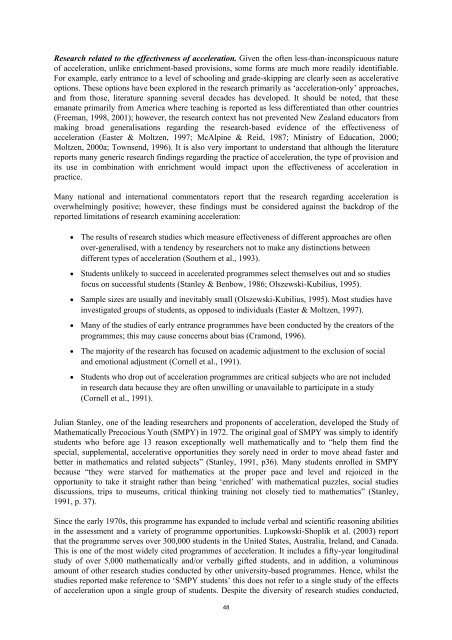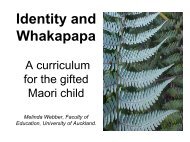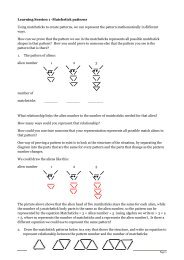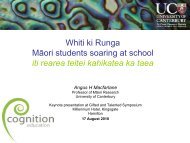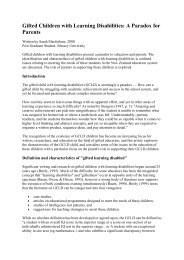The Extent, Nature and Effectiveness of Planned Approaches in ...
The Extent, Nature and Effectiveness of Planned Approaches in ...
The Extent, Nature and Effectiveness of Planned Approaches in ...
You also want an ePaper? Increase the reach of your titles
YUMPU automatically turns print PDFs into web optimized ePapers that Google loves.
Research related to the effectiveness <strong>of</strong> acceleration. Given the <strong>of</strong>ten less-than-<strong>in</strong>conspicuous nature<strong>of</strong> acceleration, unlike enrichment-based provisions, some forms are much more readily identifiable.For example, early entrance to a level <strong>of</strong> school<strong>in</strong>g <strong>and</strong> grade-skipp<strong>in</strong>g are clearly seen as accelerativeoptions. <strong>The</strong>se options have been explored <strong>in</strong> the research primarily as ‘acceleration-only’ approaches,<strong>and</strong> from those, literature spann<strong>in</strong>g several decades has developed. It should be noted, that theseemanate primarily from America where teach<strong>in</strong>g is reported as less differentiated than other countries(Freeman, 1998, 2001); however, the research context has not prevented New Zeal<strong>and</strong> educators frommak<strong>in</strong>g broad generalisations regard<strong>in</strong>g the research-based evidence <strong>of</strong> the effectiveness <strong>of</strong>acceleration (Easter & Moltzen, 1997; McAlp<strong>in</strong>e & Reid, 1987; M<strong>in</strong>istry <strong>of</strong> Education, 2000;Moltzen, 2000a; Townsend, 1996). It is also very important to underst<strong>and</strong> that although the literaturereports many generic research f<strong>in</strong>d<strong>in</strong>gs regard<strong>in</strong>g the practice <strong>of</strong> acceleration, the type <strong>of</strong> provision <strong>and</strong>its use <strong>in</strong> comb<strong>in</strong>ation with enrichment would impact upon the effectiveness <strong>of</strong> acceleration <strong>in</strong>practice.Many national <strong>and</strong> <strong>in</strong>ternational commentators report that the research regard<strong>in</strong>g acceleration isoverwhelm<strong>in</strong>gly positive; however, these f<strong>in</strong>d<strong>in</strong>gs must be considered aga<strong>in</strong>st the backdrop <strong>of</strong> thereported limitations <strong>of</strong> research exam<strong>in</strong><strong>in</strong>g acceleration:• <strong>The</strong> results <strong>of</strong> research studies which measure effectiveness <strong>of</strong> different approaches are <strong>of</strong>tenover-generalised, with a tendency by researchers not to make any dist<strong>in</strong>ctions betweendifferent types <strong>of</strong> acceleration (Southern et al., 1993).• Students unlikely to succeed <strong>in</strong> accelerated programmes select themselves out <strong>and</strong> so studiesfocus on successful students (Stanley & Benbow, 1986; Olszewski-Kubilius, 1995).• Sample sizes are usually <strong>and</strong> <strong>in</strong>evitably small (Olszewski-Kubilius, 1995). Most studies have<strong>in</strong>vestigated groups <strong>of</strong> students, as opposed to <strong>in</strong>dividuals (Easter & Moltzen, 1997).• Many <strong>of</strong> the studies <strong>of</strong> early entrance programmes have been conducted by the creators <strong>of</strong> theprogrammes; this may cause concerns about bias (Cramond, 1996).• <strong>The</strong> majority <strong>of</strong> the research has focused on academic adjustment to the exclusion <strong>of</strong> social<strong>and</strong> emotional adjustment (Cornell et al., 1991).• Students who drop out <strong>of</strong> acceleration programmes are critical subjects who are not <strong>in</strong>cluded<strong>in</strong> research data because they are <strong>of</strong>ten unwill<strong>in</strong>g or unavailable to participate <strong>in</strong> a study(Cornell et al., 1991).Julian Stanley, one <strong>of</strong> the lead<strong>in</strong>g researchers <strong>and</strong> proponents <strong>of</strong> acceleration, developed the Study <strong>of</strong>Mathematically Precocious Youth (SMPY) <strong>in</strong> 1972. <strong>The</strong> orig<strong>in</strong>al goal <strong>of</strong> SMPY was simply to identifystudents who before age 13 reason exceptionally well mathematically <strong>and</strong> to “help them f<strong>in</strong>d thespecial, supplemental, accelerative opportunities they sorely need <strong>in</strong> order to move ahead faster <strong>and</strong>better <strong>in</strong> mathematics <strong>and</strong> related subjects” (Stanley, 1991, p36). Many students enrolled <strong>in</strong> SMPYbecause “they were starved for mathematics at the proper pace <strong>and</strong> level <strong>and</strong> rejoiced <strong>in</strong> theopportunity to take it straight rather than be<strong>in</strong>g ‘enriched’ with mathematical puzzles, social studiesdiscussions, trips to museums, critical th<strong>in</strong>k<strong>in</strong>g tra<strong>in</strong><strong>in</strong>g not closely tied to mathematics” (Stanley,1991, p. 37).S<strong>in</strong>ce the early 1970s, this programme has exp<strong>and</strong>ed to <strong>in</strong>clude verbal <strong>and</strong> scientific reason<strong>in</strong>g abilities<strong>in</strong> the assessment <strong>and</strong> a variety <strong>of</strong> programme opportunities. Lupkowski-Shoplik et al. (2003) reportthat the programme serves over 300,000 students <strong>in</strong> the United States, Australia, Irel<strong>and</strong>, <strong>and</strong> Canada.This is one <strong>of</strong> the most widely cited programmes <strong>of</strong> acceleration. It <strong>in</strong>cludes a fifty-year longitud<strong>in</strong>alstudy <strong>of</strong> over 5,000 mathematically <strong>and</strong>/or verbally gifted students, <strong>and</strong> <strong>in</strong> addition, a volum<strong>in</strong>ousamount <strong>of</strong> other research studies conducted by other university-based programmes. Hence, whilst thestudies reported make reference to ‘SMPY students’ this does not refer to a s<strong>in</strong>gle study <strong>of</strong> the effects<strong>of</strong> acceleration upon a s<strong>in</strong>gle group <strong>of</strong> students. Despite the diversity <strong>of</strong> research studies conducted,48


